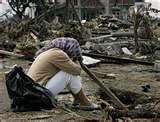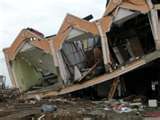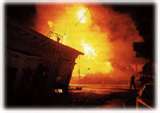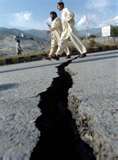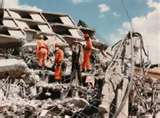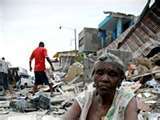Earthquakes
Earthquakes can effect our lives in many ways. They cause fires that burn buildings to the ground. This effects you because now you have nowhere to live. They also can destroy whole towns. Family members can be trapped under the rubble inside the house. Now you will mourn for their loss. During an earthquake, tsunamis are created and destroy everything in their path at the beach. This includes buildings and any other of your favorite things to do at the beach. Now you are bored all the time until they get it repaired. If you live in a small town with only one store that supplies you with everything and it gets destroyed, what do you do? You will starve unless you can get help fast. Let's say your town is under a huge cliff. There suddenly is an earthquake, which causes a landslide. Everyone is buried alive.
The earthquake hazard poses the most serious intermediate term risk to the health, safety, and economic viability of many parts of the United States and throughout the world. Recent earthquakes demonstrated the risks to modern industrial societies from such cataclysmic events, affecting everything from massive loss of life, infrastructure damage, and financial instability. Much larger earthquakes can be expected to occur adjacent to many metropolitan regions in the United States. Examples:
1. The Northridge earthquake (1994) was a modest (magnitude 6.7) event which caused 57 deaths, over $20 billion of damage, and created major disruption of the Los Angeles area infrastructure.
2. The Kobe, Japan earthquake was another modest 6.9 magnitude event that same year which caused 5,480 deaths, over 150 billion dollars of damage and a major disruption of Japan's economy with global impacts.
The earthquake hazard poses the most serious intermediate term risk to the health, safety, and economic viability of many parts of the United States and throughout the world. Recent earthquakes demonstrated the risks to modern industrial societies from such cataclysmic events, affecting everything from massive loss of life, infrastructure damage, and financial instability. Much larger earthquakes can be expected to occur adjacent to many metropolitan regions in the United States. Examples:
1. The Northridge earthquake (1994) was a modest (magnitude 6.7) event which caused 57 deaths, over $20 billion of damage, and created major disruption of the Los Angeles area infrastructure.
2. The Kobe, Japan earthquake was another modest 6.9 magnitude event that same year which caused 5,480 deaths, over 150 billion dollars of damage and a major disruption of Japan's economy with global impacts.
